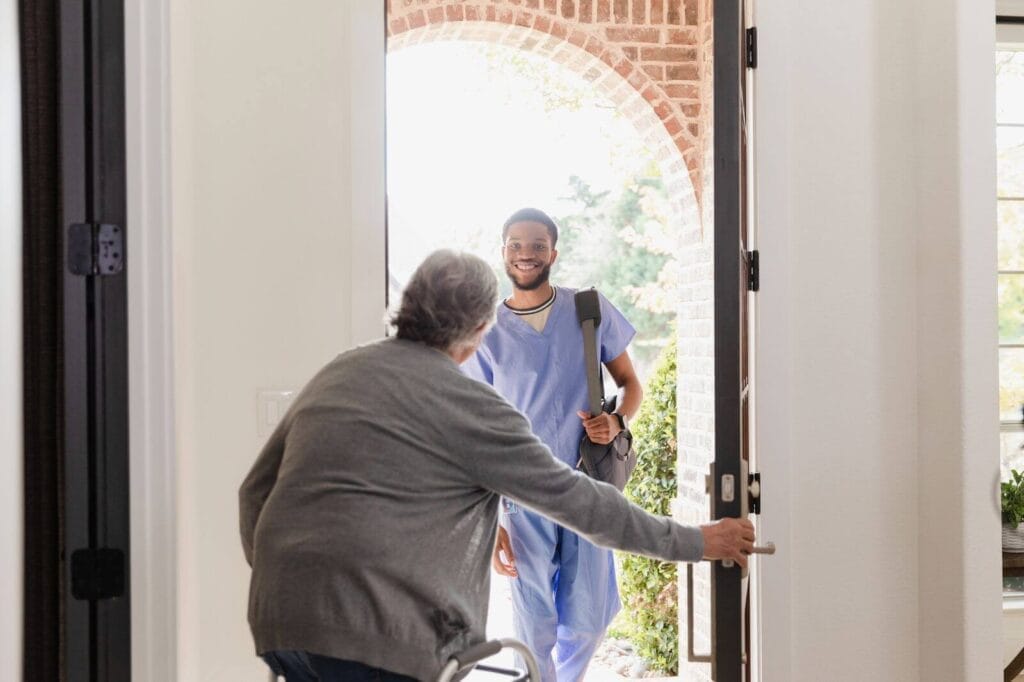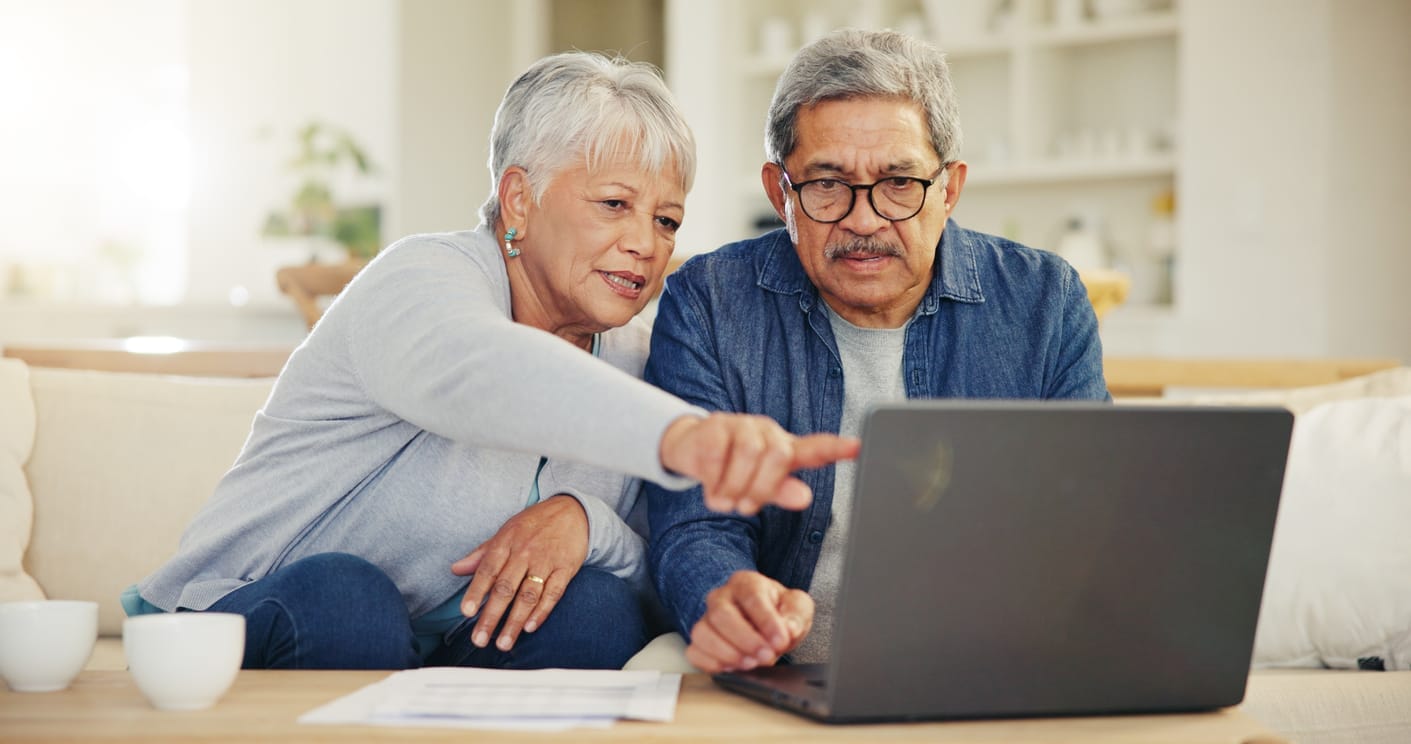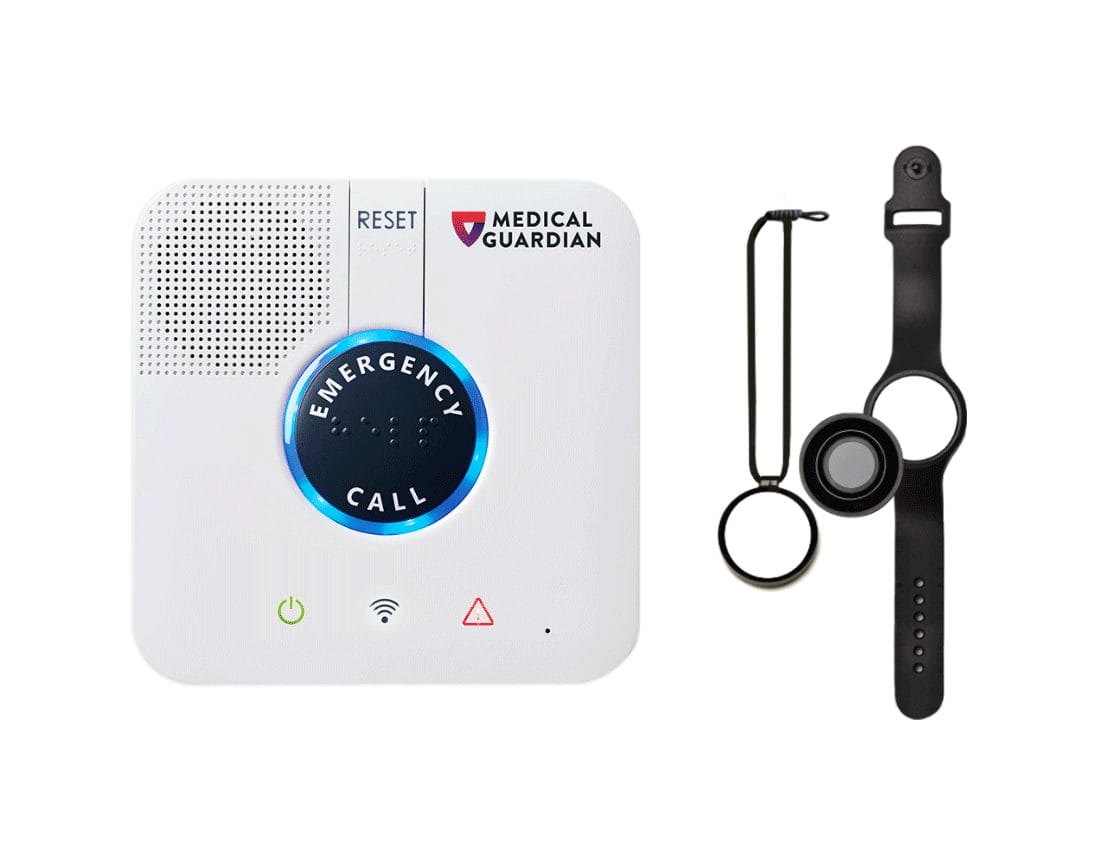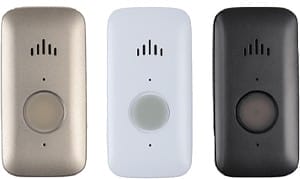
Senior U.S. military Veterans may need help with daily activities as they age or have medical needs that require a caregiver. Often, securing the help comes at a great cost. The U.S. Department of Veterans Affairs (VA) offers robust Veterans home care services to help meet all their needs.
VA recognizes family caregivers’ roles in the health and well-being of Veterans’ lives when they live at home rather than in a nursing home, assisted living, or other senior living community. VA home care programs include services that help family caregivers as well. Here, we explain the various Veterans home care programs that qualifying Veterans and family caregivers can access to make their lives at home as comfortable, safe, and enjoyable as possible.
VA home- and community-based programs and services
Several home- and community-based options are available for senior Veterans aging in place rather than living in a residential senior living community. VA supports eligible Veterans throughout their senior years and provides assistance where needed. Let’s take a look at the home care programs offered through VA.
Adult day health care (ADHC)
A Veteran who lives at home may live alone or with a spouse or another family member. If they need help with activities of daily living or have a physical or cognitive impairment, the person they live with or an outside resource must provide the assistance. VA’s adult day health care can be a great help to the Veteran and whoever lives with them.
VA’s adult day health care program provides Veterans a place to go during daytime hours for socialization, engagement, and care services. Veterans with a range of needs can attend the programs, including those with physical disabilities, traumatic brain injuries, mild to severe Alzheimer’s disease, and other conditions. Daily programming and activities entertain and stimulate attendees, offering Veterans a well-rounded experience that meets their physical, cognitive, and social needs.
You can find these programs at places like VA medical centers and state Veterans homes or through local organizations. Participants often attend the programs a few days per week, either for part of the day or for a full day.
The professionals at each program may vary, but you can often find social workers, therapists, nurses, and people with other specialties to help Veterans receive the care they need. Though some Veterans may live alone and attend ADHC programs, others live with family members or spouses. This type of community program allows Veterans to receive the care they need while outside the home, offering a break to family caregivers.
Respite care
This type of VA home care is a key component for any Veteran who gets help with daily tasks from a family caregiver. Caring for a family member is meaningful and fulfilling, but it can also be tiring and stressful. Respite care is a service where professional caregivers assist a person for a short time with activities of daily life or other household tasks rather than the primary family caregiver, such as the spouse or the adult child of the person in need. This win-win situation allows the person to receive the important care they require and also gives the primary caregiver a break to focus on their own life, personal tasks, or relaxation.
VA respite care is convenient because Veterans and their families can access the services in a few ways:
- •At home: A professional caregiver goes to the Veteran’s home. This is a great option for the caregiver if they have to be out of the house during the day for appointments, engagements, or errands.
- •At a day program: The Veteran can attend a VA adult day health care program if there is one in their area. If the caregiver needs time at home to rest or focus on household tasks or simply wants to have time alone, utilizing a VA adult day health care program can effectively meet both the caregiver’s and the Veteran’s needs.
- •In a nursing home: The Veteran can stay at a VA nursing home in their area for a short period if needed. This arrangement is helpful if the family caregiver needs to be away for longer than a respite caregiver can go to the home. If the family caregiver needs to travel for a few days, they do not have to worry about the Veteran when they are under the care of a nursing home team.
With respite care through VA, both the Veteran and caregiver can get necessary care without added stress.
Home-based primary care (HBPC)
Through VA’s home-based primary care, Veterans receive health care at their home. This program is helpful for a person with medical needs that make traveling a challenge, such as cognitive or functional impairments. A Veteran whose caregiver no longer drives may also be a great candidate for this type of program.
This service provides well-rounded and comprehensive primary care to qualifying Veterans within a 40-mile radius of a VA medical center. Various medical professionals go to the Veteran’s home, including primary care physicians, nurses, nurse practitioners, dieticians, social workers, various therapists, psychologists, and pharmacy services. Because HBPC supports Veterans who find traveling challenging, it also offers telehealth services to aid in managing chronic conditions.
The main purpose of the home-based primary care program is to allow the Veteran to live at home as long as possible and help the family manage a Veteran’s chronic conditions. Nursing visits, medication setup, lab draws, and other services help achieve this goal. Psychologists can also help both the Veteran and the caregiver with managing the conditions and the emotional well-being of everyone in the household.
Skilled home health care
Skilled home health care is similar to HBPC in some ways, but it is a different type of home care program. Both HBPC and skilled home care provide medical professionals who attend to the Veteran’s needs at home, but some of the purposes differ. HBPC features VA medical center professionals like primary care physicians, nurses, and dieticians to ensure that the Veteran has long-term access to health care professionals who can help them manage chronic conditions and overall physical and mental health. On the other hand, skilled home health care provides short-term subacute services to help a Veteran transition home from a hospital, skilled nursing facility, or nursing home stay when they still need health care from licensed professionals.
The types of services offered in skilled care are typically given in a hospital, nursing home, or rehabilitation facility, but some Veterans may still need those services as they transition back home or on a continued basis while living at home. Perhaps a Veteran needs physical therapy, intravenous medications, or other services that require licensed health care providers. VA contracts with an agency to send these professionals to the Veteran’s home so the person can be discharged from the hospital or facility and transition back home with the proper level of care.
Homemaker and home health aides
Older adults may need help performing activities of daily living, like bathing, getting dressed, feeding, toileting, and transferring from one position to another. Home health aides are professional caregivers trained to help with these tasks. Especially if a senior needs help with these activities, they may also need help with instrumental activities of daily living, which are tasks not fundamental to survival, like feeding, but that help maintain their quality of life. These tasks can include meal preparation, laundry, and other activities. Homemaker services can help with these tasks.
VA’s homemaker and home health aide care program provides these services to qualified Veterans living at home. Though this particular program isn’t available strictly to senior Veterans, these services can help older adult Veterans maintain life at home rather than in a nursing home or another senior living community.
With this program, aides and caregivers go to the Veteran’s home as needed, up to multiple times per week. These services can be a great help to someone who lives at home with the Veteran, especially if they are unable to help the Veteran with these essential and instrumental tasks. The professionals who provide these services are not nurses but are trained to perform the tasks and operate under the supervision of a registered nurse who determines and oversees the services the Veteran receives.
Home hospice care
If you or your loved one is a senior Veteran and is in the advanced stages of a terminal disease, you can opt for VA’s home hospice care. Hospice care is for people with a life expectancy of six months or less who are no longer seeking curative treatment for their illness or condition. The goal of hospice care is to maximize the patient’s comfort and quality of life during this time.
Through this program, Veterans can access services that help manage their symptoms in the final stage of life. Because of the nature of this period, the Veteran’s religious practices are taken into account as needed when creating and implementing the care plan.
The services also extend to the Veteran’s loved ones. Grief counseling services are available for loved ones as their senior Veteran family member enters hospice. These services are all offered in your own home so you feel comfortable and at peace.
Hospice care is part of the medical benefits package. Veterans with Veterans Health Administration (VHA) standard medical benefits can access home hospice care if they meet the medical requirements and are not responsible for copays if they get services from VA or a provider who contracts with VA.
Palliative care
Palliative care is similar to hospice but differs in a few main ways. Veterans also have access to palliative care services through VA. Let’s briefly highlight some of the main differences between palliative and hospice care, then go into the services that VA palliative care provides Veterans.
Hospice and palliative care are both sets of services that aim to maximize the patient’s quality of life, support their comfort, and manage symptoms associated with an illness. A big difference between the two is that patients who receive palliative care services can also simultaneously seek curative treatments for their condition, disease, or illness. To qualify for hospice care, the patient cannot be seeking curative treatments. Additionally, hospice care requires that the patient has at most a six-month life expectancy, whereas palliative care services may not require such.
VA palliative home care includes a wide range of services, including:
- •Working with a care team of medical professionals like a doctor, nurse, social worker, or mental health professional. The Veteran may also include a person tied to their religious affiliation if they would like.
- •Collaboration between the Veteran and the team to determine what the Veteran hopes to achieve through the care, whether that be the management of pain or other symptoms, emotional coping assistance, or other assistance the Veteran may need to address daily life needs.
Palliative home care may be suitable for Veterans with chronic illnesses or acute conditions. This type of care focuses on the Veteran but, similar to hospice care, extends some emotional and psychological services to family members as well.
Home telehealth assistance
Whether a Veteran has transportation or mobility issues or lives in a rural area, VA’s telehealth program can keep them connected to their care team. This program leverages technology to monitor a Veteran’s health status, enables communication between the Veteran and their health care provider, and ensures that real-time data is available to all parties.
Here are some of the services within the VA telehealth program:
- •Remote patient monitoring: A Veteran can virtually share with their doctor information like vital signs and other data.
- •Phone visits: A Veteran can make and hold appointments by phone.
- •VA Video Connect: A Veteran can have an appointment on a device that supports video calls, such as a smartphone, computer, or tablet. This allows doctors and patients to see each other despite the distance and difficulty with travel.
- •VA Mobile: VA has smartphone apps available to Veterans that allow patients and doctors to share important information in a secure and immediate fashion. Veterans can access information like test results and other data once they are in the system.
Depending on the type of telehealth service a Veteran qualifies to use, VA may provide the Veteran with the appropriate device(s) along with training on how to properly use it. The Veteran has access to a care coordinator, who can assist with scheduling and maintaining the use of the program.
Veteran-directed care
This type of VA home care is really an approach to how the Veteran receives the care they need. Those who need help with activities of daily living and qualify for Veteran community care may be eligible to choose Veteran-directed care.
Rather than receiving care from the VA-directed providers, the Veteran is responsible for hiring, managing, and paying for their care services. The Veteran has a budget that they must work within to secure the care services they need. Individuals who want greater control over their care providers can have that freedom while still having access to a coordinator who can help them.
How to qualify and apply for Veteran home care programs
Veterans enrolled in VA health care may be eligible for Veteran home care services if they qualify. VA requires that Veterans interested in receiving any of these programs show they have a medical need for the services. The Veteran must also live in an area where these services are available.
To enroll, you first have to be enrolled in VA health care and receive services at a VA health care facility. If you do not already have the standard medical benefits package, there are VA health care eligibility requirements you must meet.
If you are enrolled in VA health care, you can apply by mail, online, in person, or over the phone. There are a few pieces of documentation you’ll need to provide. VA lists these documents, the form to complete, and contact numbers to call if you would like to apply by phone or need help with your application here. You can also contact your local VA center to ask for assistance with the process.
How to pay for VA home care programs
The Veteran’s service-connected disability status and income are factors that determine how much the Veteran’s copay will be for the VA home care programs they receive. Some services, such as hospice care, have no copays, so it also depends on the type of home care the Veteran wants to receive. If the Veteran receives care for a condition that isn’t connected to their service, VA may need to bill the Veteran’s insurance, so they may have a copay for some services.
If you qualify for a service but don’t have the financial means to cover the costs, you may have other options. Many financial support opportunities are available to help cover in-home care costs for senior Veterans. If the Veteran has certain health needs, the VA Aid and Attendance benefit can provide up to thousands of dollars per month that can help pay for care. The Aid and Attendance benefit is considered additional income that qualifying Veterans can use to cover senior care costs. It is issued to Veterans who are already eligible for monthly VA pension benefits and meet qualifying financial and health criteria.
If the Veteran has long-term care insurance, they may be able to utilize their insurance policy to help pay for that care. In order to make a claim on the policy, the policyholder must have a documented triggering event and, for most policies, need assistance with at least two activities of daily living. If the Veteran meets these requirements, using a long-term care insurance policy can go a long way in offsetting the cost of VA home care services.
Getting home care services for Veterans
If you or your beloved senior Veteran needs in-home assistance, VA is there to help. The programs mentioned above were designed to help with daily responsibilities for both the Veteran and their chosen at-home caregiver.
Much financial assistance may be available to eligible Veterans. Contact your local or regional VA center by phone, on the internet, or in person to apply for these at-home services. A specialist can help you decide which program will best meet the needs of the Veteran.








